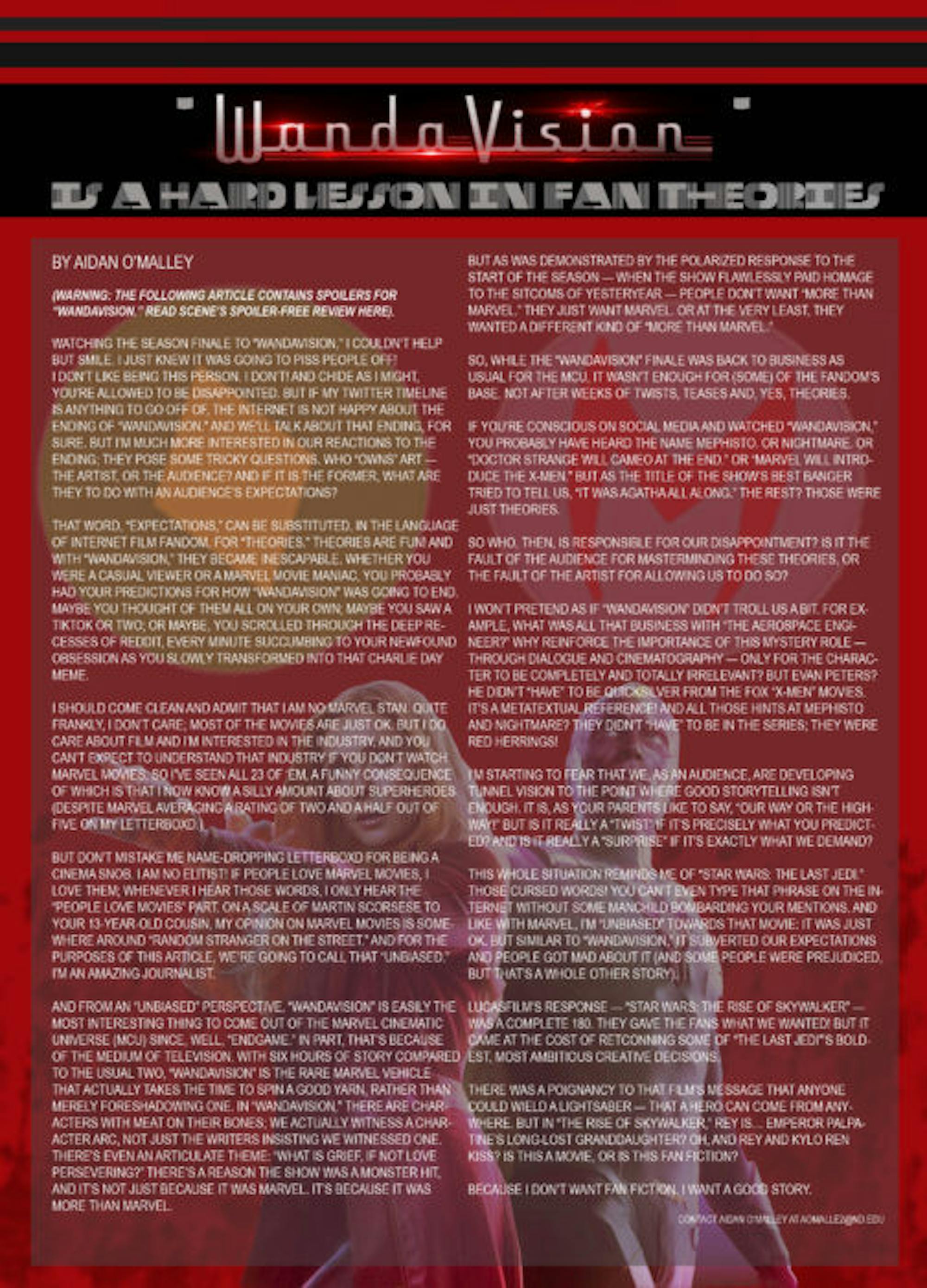
(Warning: The following article contains spoilers for “WandaVision.” Read Scene’s spoiler-free review here).
Watching the season finale to “WandaVision,” I couldn’t help but smile. I just knew it was going to piss people off!
I don’t like being this person. I don’t! And chide as I might, you’re allowed to be disappointed. But if my Twitter timeline is anything to go off of, the Internet is not happy about the ending of “WandaVision.” And we’ll talk about that ending, for sure. But I’m much more interested in our reactions to the ending; they pose some tricky questions. Who “owns” art — the artist, or the audience? And if it is the former, what are they to do with an audience’s expectations?
That word, “expectations,” can be substituted, in the language of Internet film fandom, for “theories.” Theories are fun! And with “WandaVision,” they became inescapable. Whether you were a casual viewer or a Marvel movie maniac, you probably had your predictions for how “WandaVision” was going to end. Maybe you thought of them all on your own; maybe you saw a TikTok or two; or maybe, you scrolled through the deep recesses of Reddit, every minute succumbing to your newfound obsession as you slowly transformed into that Charlie Day meme.
I should come clean and admit that I am no Marvel stan. Quite frankly, I don’t care; most of the movies are just OK. But I do care about film and I’m interested in the industry, and you can’t expect to understand that industry if you don’t watch Marvel movies. So I’ve seen all 23 of ‘em, a funny consequence of which is that I now know a silly amount about superheroes (despite Marvel averaging a rating of two and a half out of five on my Letterboxd.)
But don’t mistake me name-dropping Letterboxd for being a cinema snob. I am no elitist! If people love Marvel movies, I love them; whenever I hear those words, I only hear the “people love movies” part. On a scale of Martin Scorsese to your 13-year-old cousin, my opinion on Marvel movies is somewhere around “random stranger on the street.” And for the purposes of this article, we’re going to call that “unbiased.” I’m an amazing journalist.
And from an “unbiased” perspective, “WandaVision” is easily the most interesting thing to come out of the Marvel Cinematic Universe (MCU) since, well, “Endgame.” In part, that’s because of the medium of television. With six hours of story compared to the usual two, “WandaVision” is the rare Marvel vehicle that actually takes the time to spin a good yarn, rather than merely foreshadowing one. In “WandaVision,” there are characters with meat on their bones; we actually witness a character arc, not just the writers insisting we witnessed one. There’s even an articulate theme: “What is grief, if not love persevering?” There’s a reason the show was a monster hit, and it’s not just because it was Marvel. It’s because it was more than Marvel.
But as was demonstrated by the polarized response to the start of the season — when the show flawlessly paid homage to the sitcoms of yesteryear — people don’t want “more than Marvel.” They just want Marvel. Or at the very least, they wanted a different kind of “more than Marvel.”
So, while the “WandaVision” finale was back to business as usual for the MCU, it wasn’t enough for (some) of the fandom’s base. Not after weeks of twists, teases and, yes, theories.
If you’re conscious on social media and watched “WandaVision,” you probably have heard the name Mephisto. Or Nightmare. Or “Doctor Strange will cameo at the end.” Or “Marvel will introduce the X-Men.” But as the title of the show’s best banger tried to tell us, “It was Agatha all along.” The rest? Those were just theories.
So who, then, is responsible for our disappointment? Is it the fault of the audience for masterminding these theories, or the fault of the artist for allowing us to do so?
I won’t pretend as if “WandaVision” didn’t troll us a bit. For example, what was all that business with “the aerospace engineer?” Why reinforce the importance of this mystery role — through dialogue and cinematography — only for the character to be completely and totally irrelevant?
But Evan Peters? He didn’t “have” to be Quicksilver from the Fox “X-Men” movies. It’s a metatextual reference! And all those hints at Mephisto and Nightmare? They didn’t “have” to be in the series; they were red herrings!
I’m starting to fear that we, as an audience, are developing tunnel vision to the point where good storytelling isn’t enough. It is, as your parents like to say, “Our way or the highway!” But is it really a “twist” if it’s precisely what you predicted? And is it really a “surprise” if it’s exactly what we demand?
This whole situation reminds me of “Star Wars: The Last Jedi.” Those cursed words! You can’t even type that phrase on the Internet without some manchild bombarding your mentions. And like with Marvel, I’m “unbiased” towards that movie: It was just OK. But similar to “WandaVision,” it subverted our expectations and people got mad about it (and some people were prejudiced, but that’s a whole other story).
Lucasfilm’s response — “Star Wars: The Rise of Skywalker” — was a complete 180. They gave the fans what we wanted! But it came at the cost of retconning some of “The Last Jedi”’s boldest, most ambitious creative decisions.
There was a poignancy to that film’s message that anyone could wield a lightsaber — that a hero can come from anywhere. But in “The Rise of Skywalker,” Rey is… Emperor Palpatine’s long-lost granddaughter? Oh, and Rey and Kylo Ren kiss? Is this a movie, or is this fan fiction?
Because I don’t want fan fiction. I want a good story.
Read More
Trending









